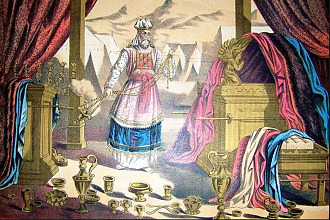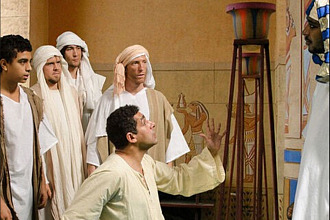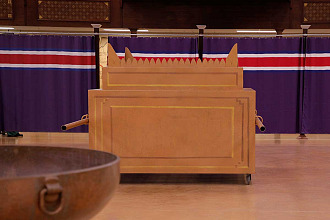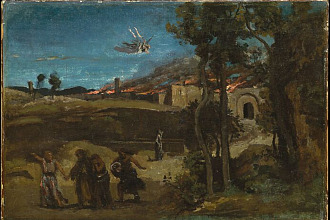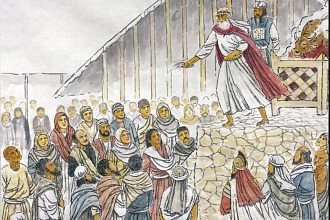Parasha for the Week: Behar: Leviticus 25:1 – 26:2
Parasha for the Week: Bekhukotai: Leviticus 26:3 – 27:34
Haftara: Jeremiah 32:6 - 27
Brit HaChadasha: Hebrews 4
Overview Behar:
The Torah prohibits normal farming of the Land of Israel every seven years. This “Shabbat” for the Land is called “shemita”. After every seventh shemita, the fiftieth year, yovel (jubilee) is announced with the sound of the shofar on Yom Kippur. This was also a year for the Land to lie fallow. G-d promises to provide a bumper crop prior to the shemita and yovel years. During yovel, all land is returned to its original division from the time of Joshua, and all Jewish indentured servants are freed, even if they have not completed their six years of work. A Jewish indentured servant may not be given any demeaning, unnecessary or excessively difficult work, and may not be sold in the public market. The price of his labor must be calculated according to the amount of time remaining until he will automatically become free. The price of land is similarly calculated. Should anyone sell his ancestral land, he has the right to redeem it after two years. If a house in a walled city is sold, the right of redemption is limited to the first year after the sale. The Levites’ cities belong to them forever. The Jewish People are forbidden to take advantage of one another by lending or borrowing with interest. Family members should redeem any relative who was sold as an indentured servant as a result of impoverishment.
Overview Bekhukotai:
The Torah promises prosperity for the Jewish People if they follow G-d’s commandments. However, if they fail to live up to the responsibility of being the Chosen People, then chilling punishments will result. The Torah details the harsh historical process that will fall upon them when Divine protection is removed. These punishments, whose purpose is to bring the Jewish People to repent, will be in seven stages, each more severe than the last. Sefer Vayikra, the book of Leviticus, concludes with the details of erachin—the process by which someone vows to give the Beit Hamikdash the equivalent monetary value of a person, an animal or property.
“Behar and Bekhukotai"
This Shabbat we read the two Parashot, Behar and Bekhukotai. With this reading we conclude the third Book of the Torah, the Book of Leviticus (Vayikra). Behar, is composed of two words: be and har, be is a preposition and means “in” or “on” and har means “Mountain” thus the translation of Behar is “on Mount”, the next word in the parasha is “Sinai”. G-d wants to specify that these rules as the entire Torah were given on Mount Sinai.
Bekhukotai, is composed also of two words: be and khukotai, from the root khok / khuk which means “decree” and “statute” and the suffix “Ai” read like English “I” is the possessive “My”. Bekhukotai means “in my decrees” to stay in the decrees of the L-rd or to follow His laws.
“Sabbatical Year"
Parashat Behar begins with the mitzvah of letting fields rest during Shmita (Sabbatical year): The torah states: “the L-rd spoke to Moshe on Mount Sinai saying: Speak to the children of Israel and say to them. When you come into the land which I give you, the land shall keep a Sabbath unto the L-rd. Six years you shall sow your field and six years you shall prune your vineyard and gather in its produce. But a Sabbath of solemn rest shall be in the seventh year; you shall not sow your field and you shall not prune your vineyard...” (Lev 25:1-4). Whatever grew in the seventh year belonged to everyone equally. As to the question, “What shall we eat the seventh year?” G-d promises, “ I will send you such a blessing in the sixth year that the land will yield enough for three years.” (Lev. 25:21) The number seven is significant in Judaism. The weekly Shabbat is the seventh day of each week. The seventh month is the month of Rosh Hashana, Yom Kippur and Tabernacle feasts. The seventh year is the year of Shmita. After seven Shmita years is the “Jubilee” year Yovel. At a wedding we recite Sheva Brachot— “seven blessings.” In preparation for receiving the Torah on Shavuot, we count Sefirah the omer for seven weeks from Pesach. The patriarchs (Abraham, Yitzchak, Yaakov) and the matriarchs (Sarah, Rivkah, Rachel, Leah) total seven people. Moshe Rabeinu (Moses) was the seventh generation from Abraham (Abraham, Isaac, Jacob, Levi, Kehat, Amram, Moshe). Indeed, our sages say, “The seventh is favored.” Jewish years that can be divided by 7 at the Sabbatical years. The next one will be 5775, from Yom Kippur 2014 to Yom Kippur 2015.
“Blessings and Punishment”
Parshat BeChukotei begins, “If in My statutes you will walk and My commandments you will keep and do them; then I will give your rains in their seasons and the land shall yield its produce, the trees of the field shall yield their produce and your threshing shall reach vintage and the vintage shall reach into the sowing time; and you shall eat your bread in fullness and satisfaction and you will dwell in safety in your land. And I will give peace in the land...” (Lev 26:3-5). After describing the many blessings which will come as a result of observing G-d’s commandments, the Torah describes the punishments which will befall the Jewish people if they (G-d forbid) abandon G-d’s commandments. Twice in the Torah (in this Parsha and in Deuteronomy, Parshat Ki Tavo), we find a description of punishments - called “Tochacha” - for not observing the Torah. However this punishment does not mean that G-d abandon his people or cancel his covenant with Israel. In this parasha we have this statement from G-d “Yet, even then, when they are in the land of their enemies, I will not reject them or spurn them so as to destroy them, annulling My covenant with them: for I the LORD am their God.” (Lev. 26:44).
“Why a Sabbatical Year?"
Four reasons why G-d ordained that Israel have a keep a Sabbatical Year: First, we should devote that year to Torah study and spiritual elevation. Second, it is good for the fields to rest and not to be submitted to intensive agriculture which exhausts the ground and makes it less and less productive. Third, not to work in the fields during the sabbatical year strengthens one’s reliance and dependence on G-d. During the other six years one may attribute their success to their own hard work. By resting during the seventh year, we must rely completely on G-d. Thus, our faith in G-d becomes stronger. Fourth, through the Sabbatical year we can better appreciate the needs of the poor who continually rely on the mercy and generosity of others.
Haftara: Jeremiah 32:6 - 27
In this text of Jeremiah we have an illustration of the year of Yovel. “The word of the LORD came to me: Hanamel son of your uncle Shallum is going to come to you and say, “Buy my field that is at Anathoth, for the right of redemption by purchase is yours’” (Jer. 32:6-7).
However, Jeremiah wanted to be certain that this revelation was truly from G-d. It was a strange order. Jeremiah had received the revelation from G-d that the people of Israel would be deported to Babylon, Jerusalem and the temple would be destroyed. There was no sense in buying a property now. It would be better to keep these seventeen shekels of silver and to use them in Babylon where they would be living. It was very strange. The L-rd had to confirm to Jeremiah that this revelation was true. And it was confirmed by his cousin. “Then my cousin Hanamel came to me in the court of the guard, in accordance with the word of the L-RD, and said to me, ‘Buy my field that is at Anathoth in the land of Benjamin, for the right of possession and redemption is yours; buy it for yourself.’ Then I knew that this was the word of the L-RD” (Jer. 32:8). He obeyed and bought the land. “I bought the field at Anathoth from my cousin Hanamel, and weighed out the money to him, seventeen shekels of silver. I signed the deed, sealed it, got witnesses, and weighed the money on scales. (Jer. 32:9-10). Why did the L-rd want Jeremiah to spend this money in Jerusalem, to buy land that would be taken by the Babylonians? “Thus says the L-rd of hosts, the G-d of Israel: Take these deeds, both this sealed deed of purchase and this open deed, and put them in an earthenware jar, in order that they may last for a long time. For thus says the L-rd of hosts, the G-d of Israel: Houses and fields and vineyards shall again be bought in this land“ (Jer. 32:14-15). The main message of this purchase is that there is hope. G-d is not going to abandon His people or to reject them. He wants to teach them a lesson. He wants to push them to fulfill his mission which is to share the knowledge of G-d. That is why this money was not lost. OUR HOPE IS IN THE L-RD.
Brit HaChadasha: Hebrews 4
The concept of the Sabbath is very important in the Bible; in the Tanach and the Brit Hachadash too. It is one of the first commandments given by G-d in Eden (Gen 2:1-3). It has been included in the Ten Commandments, written on the tables of stone, by the finger of G-d, showing in this way that the Sabbath is as much important as the commandments of having only one G-d or not to kill. In our parasha God has repeated again the commandment of the Sabbath “Observe my Sabbaths and have reverence for my sanctuary. I am the L-rd.” (Lev 26:2). And this concept is so important that G-d has extended the concept by requesting the land to rest also on the 7th year (Sabbatical year) and to redeem the lands and the people after seven Sabbatical year (7x7+1) the fiftieth year which was decreed as the year of Jubilee. (Lev 25). The Jewish tradition has understood this concept of rest on the 7th… saying that even the world will last 6000 years and then on the 7th millennium the earth will be in rest (or Sabbatical) for 1000 years “R. Kattina said: The world is to last six thousand years, and one thousand it will be desolate” (Rosh Hashana 31a). Idea which is in complete agreement with the affirmation of Yochanan in Revelation 20 who develops what will happen during this thousand year of desolation. It is not surprising that the Brit Hachadasha reminds us that the Sabbath is still valid and important. Yeshua and the disciples were faithful to the Shabbat. The author of Hebrews is very clear on this point “There remains, then, a Sabbath-rest for the people of God” (Heb 4:9). Yeshua said that he did not come to cancel the laws (Matt 5:17). In Hebrews the seventh-day is confirmed “For somewhere he has spoken about the seventh day in these words: ‘On the seventh day God rested from all his work.’; Let us, therefore, make every effort to enter that rest, so that no one will fall by following their example of disobedience.” (Heb 4:4; 11)









